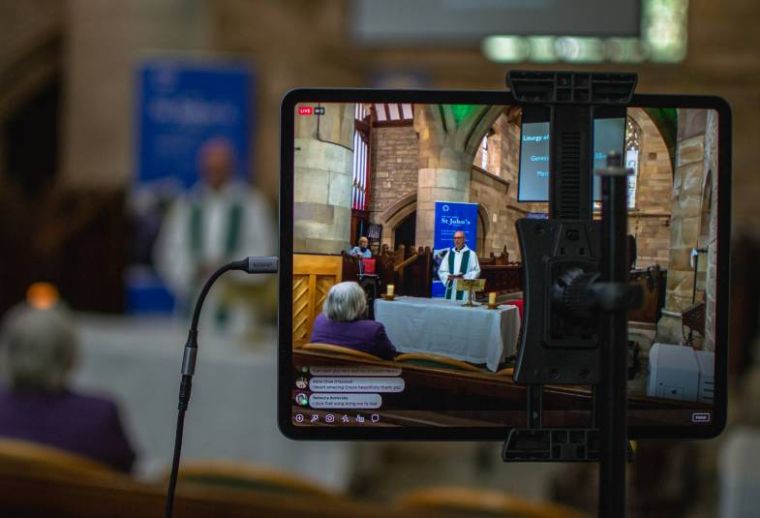Church of England urged 'to recover its confidence in God' amid widespread indifference

A senior Church of England adviser has called on the CofE to recover its "confidence in God and in the gospel" and "to communicate that gospel before all else with humility and sensitivity, but also boldness."
Rev Stephen Hance, the CofE's 'national lead for evangelism and witness' made the call following publication of research showing how the CofE is perceived. Among a range of findings, the research showed that "very many people have no real sense of who or what the church is, who it is for, or how it operates."
Many people, it found, "do not think about the church at all."
A 'mission map' quoted in the research, 'Seeing Ourselves as Others See Us' indicated that nearly two-thirds (62 per cent) of the UK population were either indifferent or dismissive of church and faith.
Commenting on the overall research that he had conducted as part of a CofE project to help the church articulate a new vision and strategy, Rev Hance said that it contained important messages of confidence and courage.
"We can have confidence," he explained, "because the church continues to be positively regarded by many, albeit less so by some groups than others.
"Our culture may have drifted from Christian moorings, but a residual fondness for the Church of England remains, together with a belief that it is uniquely placed to play a unifying role in society.
"More importantly, we need to recover our confidence in God and in the gospel, seeking to communicate that gospel before all else with humility and sensitivity, but also boldness."
Courage was also needed, said Rev Hance, a former Dean of Derby, and Director of Mission for Southwark diocese.
"We need courage to use our opportunities to speak of Jesus, particularly with younger spiritual seekers who do not think of us an ally in that search," he said.
"We need courage to listen to what God is saying to us through the situation in which we find ourselves.
"We need courage to change, letting go of good things from the past to become the church we are called to be for the future."
The research showed that the most common perception of the CofE is one of 'benign indifference.' Levels of trust in the church remained 'generally high,' but not universally so and not as high among younger people.
"For them," the research indicated, "benign indifference can tip over into outright hostility on LGBTQ+ issues."
The Church was generally regarded with 'fondness and appreciation', with much support for the CofE's engagement in social action, and interest in the Church's role as a unifying element in society.
Other key findings included the vital importance of the local church.
Put simply, "for most people the local trumps the national manifestation of the Church of England", and the good impression at local level carries more weight than statements made by archbishops or bishops.
Rev Hance explained, "A friendly, welcoming vicar, a priest who goes the extra mile for a funeral family, a parish church that is thoroughly involved in the local school, a church that serves vulnerable people, all make a positive impression."
Arguably the most disturbing of the research's key findings was that the CofE "seems very embarrassed to talk about God." Bishops were perceived to be more confident talking about social issues while, locally, Christians running food banks or other community projects, were not interested or confident in talking about their motivation.
One participant quoted in the research "wondered aloud if the CofE had stopped really believing in God and have decided to prioritise good works instead."
In response to the research's key findings, Rev Hance sets out 'Ten questions for the Church of England for the next 10 years.' These include:
- What do we want to say about God and how can the CofE motivate its people to give confident witness to the faith they share and the work of God in their own lives?
- How do we decide what social issues the church will engage with, how to back up our words with actions, and how to speak confidently in 'the public square'?
- How do we commission gifted communicators to speak on the Church's behalf?
- How does the Church develop its online presence, including online opportunities for evangelism?
- How do we enable people within the CofE "to grow as missionary disciples of Jesus in the world."?
Rev Peter Crumpler, a former Church of England communications director, commented: "At times, this research makes hard reading, especially when you realise that most people are supremely indifferent about the CofE and don't give it a thought.
"But the analysis of the challenges and opportunities for the CofE are very thought-provoking and worth close study across the Church – by bishops and senior clergy, but especially by local churches, at parochial church councils or in home groups.
"The CofE plays an important part in the life of the nation, and much of that goes on at the grassroots with social action projects. If we could articulate and communicate the gospel imperative for that work, we would have greater impact as a Christian people at this vital time."
All mission should end in local church
Why are so many UK Churches heading for extinction?
HOPE 23-24: Setting out on a national year of mission











